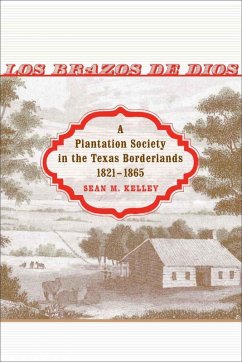Historians have long believed that the "frontier" shaped Texas plantation society, but in this detailed examination of Texas's most important plantation region, Sean M. Kelley asserts that the dominant influence was not the frontier but the Mexican Republic. The Lower Brazos River Valley -- the only slave society to take root under Mexican sovereignty -- made replication of eastern plantation culture extremely difficult and complicated. By tracing the synthesis of cultures, races, and politics in the region, Kelley reveals a distinct variant of southern slavery -- a borderland plantation society.
Kelley opens by examining the four migration streams that defined the antebellum Brazos community: Anglo-Americans and their African American slaves who constituted the first two groups to immigrate; Germans who came after the Mexican government barred immigrants from the U.S. while encouraging those from Europe; and African-born slaves brought in through Cuba who ultimately made up the largest concentration of enslaved Africans in the antebellum South. Within this multicultural milieu, Kelley shows, the disparity between Mexican law and German practices complicated southern familial relationships and master-slave interaction. Though the Mexican policy on slavery was ambiguous, alternating between toleration and condemnation, Brazos slaves perceived the Rio Grande River as the boundary between white supremacy and racial egalitarianism. As a result, thousands fled across the border, further destabilizing the Brazos plantation society.
In the1850s, nonslaveholding Germans also contributed to the upheaval by expressing a sense of ethnic solidarity in politics. In an attempt to undermine Anglo efforts to draw a sharp boundary between black and white, some Germans hid runaway slaves. Ultimately, Kelley demonstrates how the Civil War brought these issues to the fore, eroding the very foundations of Brazos plantation society.
With Los Brazos de Dios, Kelley offers the first examination of Texas slavery as a borderland institution and reveals the difficulty with which southern plantation society was transplanted in the West.
Kelley opens by examining the four migration streams that defined the antebellum Brazos community: Anglo-Americans and their African American slaves who constituted the first two groups to immigrate; Germans who came after the Mexican government barred immigrants from the U.S. while encouraging those from Europe; and African-born slaves brought in through Cuba who ultimately made up the largest concentration of enslaved Africans in the antebellum South. Within this multicultural milieu, Kelley shows, the disparity between Mexican law and German practices complicated southern familial relationships and master-slave interaction. Though the Mexican policy on slavery was ambiguous, alternating between toleration and condemnation, Brazos slaves perceived the Rio Grande River as the boundary between white supremacy and racial egalitarianism. As a result, thousands fled across the border, further destabilizing the Brazos plantation society.
In the1850s, nonslaveholding Germans also contributed to the upheaval by expressing a sense of ethnic solidarity in politics. In an attempt to undermine Anglo efforts to draw a sharp boundary between black and white, some Germans hid runaway slaves. Ultimately, Kelley demonstrates how the Civil War brought these issues to the fore, eroding the very foundations of Brazos plantation society.
With Los Brazos de Dios, Kelley offers the first examination of Texas slavery as a borderland institution and reveals the difficulty with which southern plantation society was transplanted in the West.
Dieser Download kann aus rechtlichen Gründen nur mit Rechnungsadresse in A, D ausgeliefert werden.


